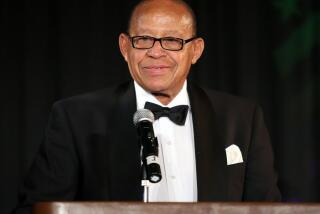Frank Wills; Guard Discovered Watergate Break-In
Frank Wills’ brush with fame began on the night of June 17, 1972, when he ripped a piece of tape off a door lock in a Washington office complex called Watergate.
But unlike other, better-known players in the greatest American political debacle in history, Wills--the security guard whose discovery of a burglary at the headquarters of the Democratic National Committee unloosed a scandal that toppled a president--did not get rich off his role as Watergate hero.
Fame, as he experienced it, was not merely fleeting. It was a curse.
When he died in an Augusta, Ga., hospital Wednesday after losing a battle with brain cancer, Wills, 52, had little to show for his role in history but a life of hardships that turned into bitterness.
“You fight for your country and stand up for it and what does it get you?” he told an interviewer in 1974, when he was out of work and asked to comment on President Richard M. Nixon’s recent pardon. “Here I did my best on the job and I get slaps in the face for it.”
The drama began on a summer night 28 years ago, shortly after Wills, then 24, had started his rounds as lone night watchman at the Watergate, a posh office-apartment complex overlooking the Potomac. He had 11 floors to inspect, marking off each office in a book as he passed.
On his way out of the building for an orange juice break, he noticed something.
Someone had taped back the lock on a basement door.
Wills stripped the tape off, thinking little of it at the time, but noted the irregularity in his log. Maintenance engineers often taped or blocked open doors when they were working and neglected to lock them when they were done.
The security guard ordinarily would not have inspected that area again for another hour or more. But something--he could say later only that it was a sixth sense--made him return after his break.
Only about 15 minutes had passed, but the door had been taped open again. Why, Wills worried, had someone put the tape back on so quickly?
He alerted his supervisor. Then, just before 2 a.m., he called the police.
A team of plainclothes detectives arrived with guns drawn. They locked the exterior doors, shut down the elevators and proceeded up the stairs. At the sixth floor, they found what they were looking for.
A door had been jimmied open, perhaps with a crowbar. It led directly into the Democratic National Committee headquarters.
The officers entered the suite quietly, with Wills trailing. Something moved in the darkness. The police ordered the shadowy figure to come out while Wills located the light switch.
When the lights came up, “one person, then two persons, then three persons came out, and on down the line,” Wills recalled. He saw that they were wearing suits and ties and rubber gloves--not the usual attire for typewriter thieves.
Even more suspicious were the tear gas guns, bugging devices and thousands of dollars in consecutively numbered $100 bills found on the five men arrested that night. They were James McCord, Bernard Barker, Eugenio Martinez, Frank Sturgis and Virgilio Gonzales.
Reporters later told Wills that the men had numbers to the White House on them when they were captured. But that night, he said, “We didn’t have any idea about who these people were and what they were up to . . . what this was connected to. I had no idea.”
When news accounts of the break-in and the White House ties began to emerge, the clock started ticking on Wills’ 15 minutes of fame. Invited to give speeches and make appearances, he was called the hero of Watergate.
But he soon became the forgotten hero, the embittered hero.
At the Watergate, he earned a raise--from $80 to $82.50 a week. He tried to talk his superiors into a promotion and better working conditions for guards, as well as for help in publicizing his role in the growing scandal.
At the same time, he was overwhelmed by the clamor of reporters wanting details of the fateful night and uncomfortable with co-workers envious of his celebrity.
“There were a lot of jokes at the start,” he told the Washington Post about a year after the break-in. “The other guards called me ‘the Watergate hero,’ ‘the Watergate bug snatcher.’ I got to the point where the joke was too damned much. I was tired of being asked so many questions, of being in the public eye. I was ready to explode, like a dinosaur ready to blow fire on everyone.”
Nothing in his life had prepared him for the hot lights of fame. He was born in Savannah, Ga. His parents were poor and broke up when he was a child. He dropped out of high school but eventually earned an equivalency degree through the Job Corps. He was working for Chrysler in Detroit when he met some people from Washington who invited him out for a visit. He took a Greyhound bus to the nation’s capital in the spring of 1971 and promptly fell in love with the city.
An employment agency sent him to a firm called General Security, which placed him in the Watergate job.
Six months after the break-in, in early 1973, he quit. His boss said it was because the attention was too much for him. Wills said it was because he wanted a better job with more benefits.
He flirted with the idea of pursuing work with the FBI or Secret Service. But he found a good job elusive.
By the end of 1973, he was angry. He had gotten another guard job with a realty company but was fired after taking two days off to visit family members. After that, he said no one would hire him because of his connection with the Watergate affair. He was living in a one-bedroom apartment on $65 a week in unemployment compensation.
The NAACP honored him and bought him a truck. The Democrats gave him a plaque but took it back when they realized they had engraved the wrong date for the break-in on it.
He played himself in the 1976 movie, “All the President’s Men,” based on the book by Washington Post reporters Bob Woodward and Carl Bernstein. But the part was so brief, he said, that “if you went to sleep for a second, you missed it.”
Over the next two decades, he was out of work for years at a time, moving between Washington and cities in the South. In 1982, he was convicted of shoplifting a pair of $16 sneakers for one of his four out-of-wedlock children.
He eventually moved to South Carolina to care for his ailing mother, attempting to live off her meager Social Security checks until her death in 1992, when he had to donate her body to medical research because he lacked the money for burial.
In 1993, he made a desperate plea for financial aid to the readers of Jet magazine, which published a short article detailing his struggles. Recently, he was living in a rural Georgia shack without electricity or telephone. His pastor, the Rev. Nathaniel Irvin, sometimes bought him food and paid his bills.
“He became disillusioned after Watergate,” Irvin said Thursday. “Somehow he felt he was put down because of . . . what he did. Society somehow turned on him. This is what he expressed to me. He felt what he did was not appreciated by people. He felt betrayed.”
Over the years, Wills sometimes blamed race for his troubles. “When you’re black and you do something wrong, everybody’s always criticizing loud,” he told The Times in 1973, “but when you’re black and do something good, nobody pays any attention.”
On other occasions, he said he was simply a victim of fate.
In 1992, on the 20th anniversary of the break-in, he was asked if he could have ignored the burglars’ tape over the door lock and not called the police, if he would react differently if he had it to do again.
Wills replied with annoyance.
“That’s like asking me if I’d rather be white than black. It was just a part of destiny.”
More to Read
Go beyond the scoreboard
Get the latest on L.A.'s teams in the daily Sports Report newsletter.
You may occasionally receive promotional content from the Los Angeles Times.











